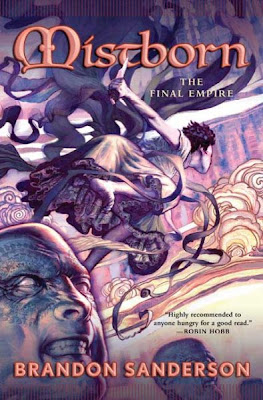
Mistborn: The Final Empire is a 2006 fantasy novel by Brandon Sanderson. It is part of the Mistborn trilogy, but is a complete story on its own (although not everything is wrapped tidily at the end) and can be read as such. In the Mistborn world, an immortal tyrant has ruled the empire for a thousand years. Now, a group of thieves and magic users undertake a plot to overthrow him.
Mistborn’s magic system is refreshingly novel. Most magic users have access to one of eight special abilities, which they activate by ingesting trace amounts of the appropriate metal. The more powerful Mistborn have access to all eight metal-based abilities, plus more, making them in essence a poor man’s hybrid of Professor Charles Xavier and Magneto. Mistborn’s main character is Vin, a sixteen year old petty thief who has just discovered that she is a Mistborn, and who has joined this conspiracy to overthrow the empire.
Most of Sanderson’s supporting cast has been drawn from the bin of generic, flat, cookie-cutter fantasy characters. His treatment of Vin, though, makes us wonder what he was thinking. Particularly early on, both Sanderson as the narrator and his characters point out repeatedly that she is timid and has low self-confidence. But Sanderson doesn’t write her that way – Vin is headstrong, stubborn, nosy, fussy and sarcastic. This is not the only time that what the characters do and what the narrator says about them do not agree. Either way, Vin isn’t a particularly interesting or likeable character.
Sanderson’s writing keeps him from getting the most out of his story, which is a shame because the magic is interesting and the plot is perfectly good. The story develops slowly. Sanderson spends the first 150 pages of the novel belaboring the magic system and having his characters speak in stiff, expository history-lesson paragraphs, almost as though he were writing this so it could be followed by small children. At 530 pages, Mistborn is at least 100 pages too long, and it’s often tough to get through.
Mistborn does get it together over the last 100 pages and has a genuinely solid and reasonably satisfactory climax. There are flashes of brilliance here, but it may be too little, too late to persuade readers to read the sequels.
In On Writing, Stephen King said, “The adverb is not your friend.” But the adverb is Sanderson’s very good friend indeed. He flings them liberally, distractingly, throughout the novel, and not only are there too many, he often makes some jarringly curious choices. And Sanderson’s dialogue throughout the novel is wooden and clunky – bad to a degree one typically finds only in world-building genre fiction like this.
Sanderson has done a good job constructing his world and his magic system, but he’s done a terrible job actually telling the story, making Mistborn: The Final Empire a frustrating and disappointing work.
TAKE IT OR LEAVE IT
